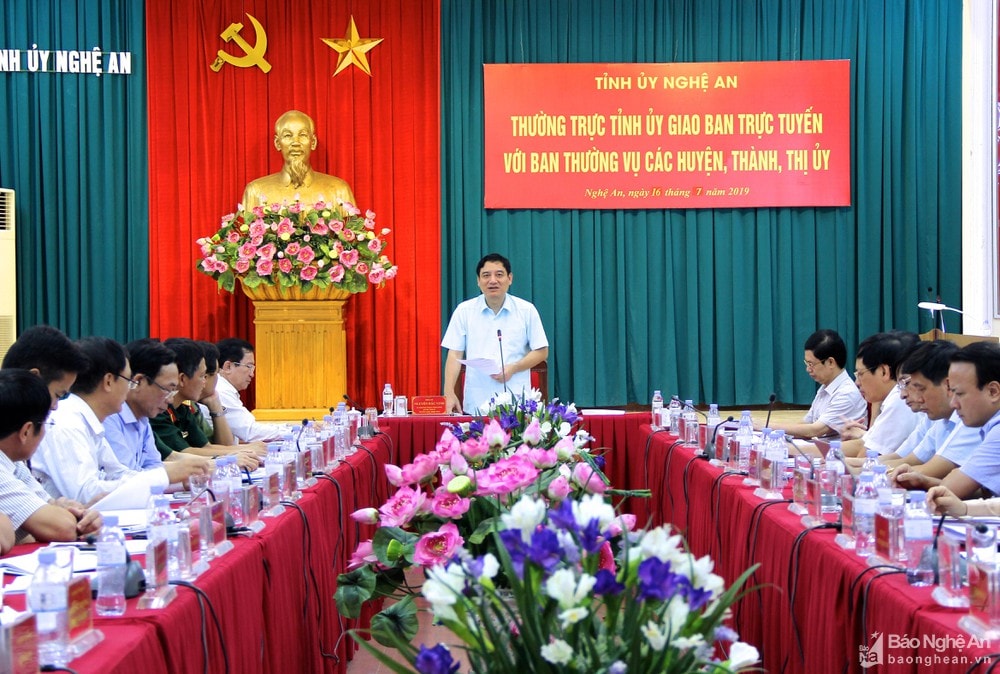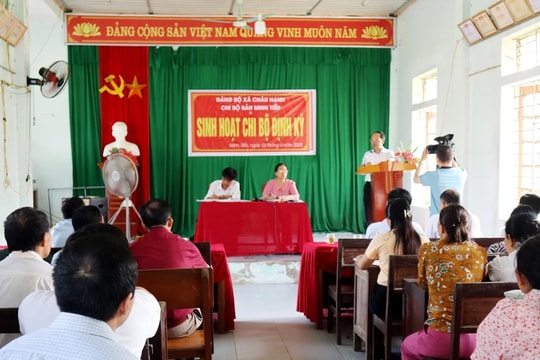Regulations on assessment and classification of collectives and individuals under the management of the Provincial Party Standing Committee
(Baonghean.vn) - The regulation clearly states the principles, subjects, and authorities; content, quality assessment criteria framework, as well as the order and procedures for assessment and classification.
 |
| The Standing Committee of the Provincial Party Committee held an online meeting with the Standing Committees of the district, city and town Party Committees. Illustrative photo: My Nga |
On October 30, 2019, Nghe An Provincial Party Committee issued Regulation No. 3223-QD/TU on annual quality assessment and classification of collectives and individuals under the management of the Provincial Party Committee Standing Committee.
The regulation clearly states the principles, subjects, authorities; content, framework of quality assessment criteria, as well as the order and procedures for assessment and classification.
- In principleThere are general principles and specific principles.
+ General principles:
- In accordance with the Party's policies, guidelines and viewpoints and the State's policies and laws.
- Ensure the principles of democratic centralism, self-criticism and criticism; solidarity and unity; honesty, objectivity, comprehensiveness; fairness, publicity, transparency; proper authority and responsibility.
- Take political qualities, ethics, and lifestyle as the foundation; results and work efficiency as the main measures in annual evaluation and classification.
- Linking individual responsibility with collective responsibility; leaders, individual leaders, and managers assigned to be in charge of fields and areas with the performance and effectiveness of the locality, organization, agency, or unit. The level of task completion of the leader must not be higher than the level of task completion of the agency, organization, or unit. The quality rating of the leadership and management collective must not be higher than the rating of the organization, agency, or unit.
- In case an officer, civil servant or public employee fails to complete his/her tasks due to objective or force majeure factors, it will be considered during the evaluation and classification process.
- Specific principles:
- Evaluate and classify the quality of the subordinate collective first, then the superior; the leadership and management collective first, then the individual members.
- Collectives and individuals who have been classified for quality but are later found to have defects or do not meet the conditions of the classified quality level will have their results canceled and be reclassified.
- Do not evaluate or classify the quality of newly established party organizations and leadership and management groups that have been established for less than 6 months. Party members who are on sick leave for a total of 3 months or more in a year will not be classified as having completed their tasks well or higher; Party members who are on maternity leave will have their quality classification results for the year based on the actual working time of that year.
- After completing the assessment and classification of the quality of organizations, collectives, individuals in localities, agencies and units, the top quality is assessed and classified.
- The competent authority shall consider and decide that the number of collectives and individuals in leadership and management classified as "Excellently completing tasks" shall not exceed 20% of the number classified as "Goodly completing tasks" according to equivalent titles at each level, each industry, each field, and each collective subject of leadership and management.
- Regarding the assessment and classification objects:
- For groups:
- Party delegation, party executive committee; Standing Committee of district party committee and party committee directly under the Provincial Party Committee; Executive Committee of grassroots party committee directly under the Provincial Party Committee.
- Collective leadership of specialized agencies advising and assisting the provincial Party Committee.
- Collective leadership of provincial departments, branches and sectors; Standing Committee of Provincial Youth Union; collective leadership of universities, colleges, public service units and equivalent units in the province.
- For individuals:
- Members of the Provincial Party Standing Committee; members of the Provincial Party Executive Committee; secretaries and deputy secretaries of the Party Committee and Party delegation; heads and deputy heads of departments, branches, sectors of the Fatherland Front, socio-political organizations of the province, public service units, universities, colleges and equivalents of the province.
- Secretary, Deputy Secretary of District Party Committee, City Party Committee, Party Committee directly under Provincial Party Committee; Chairman, Vice Chairman of People's Council, People's Committee of district, city, town; Standing Committee member, Executive Committee member of Party Committees at higher levels at the grassroots level.


